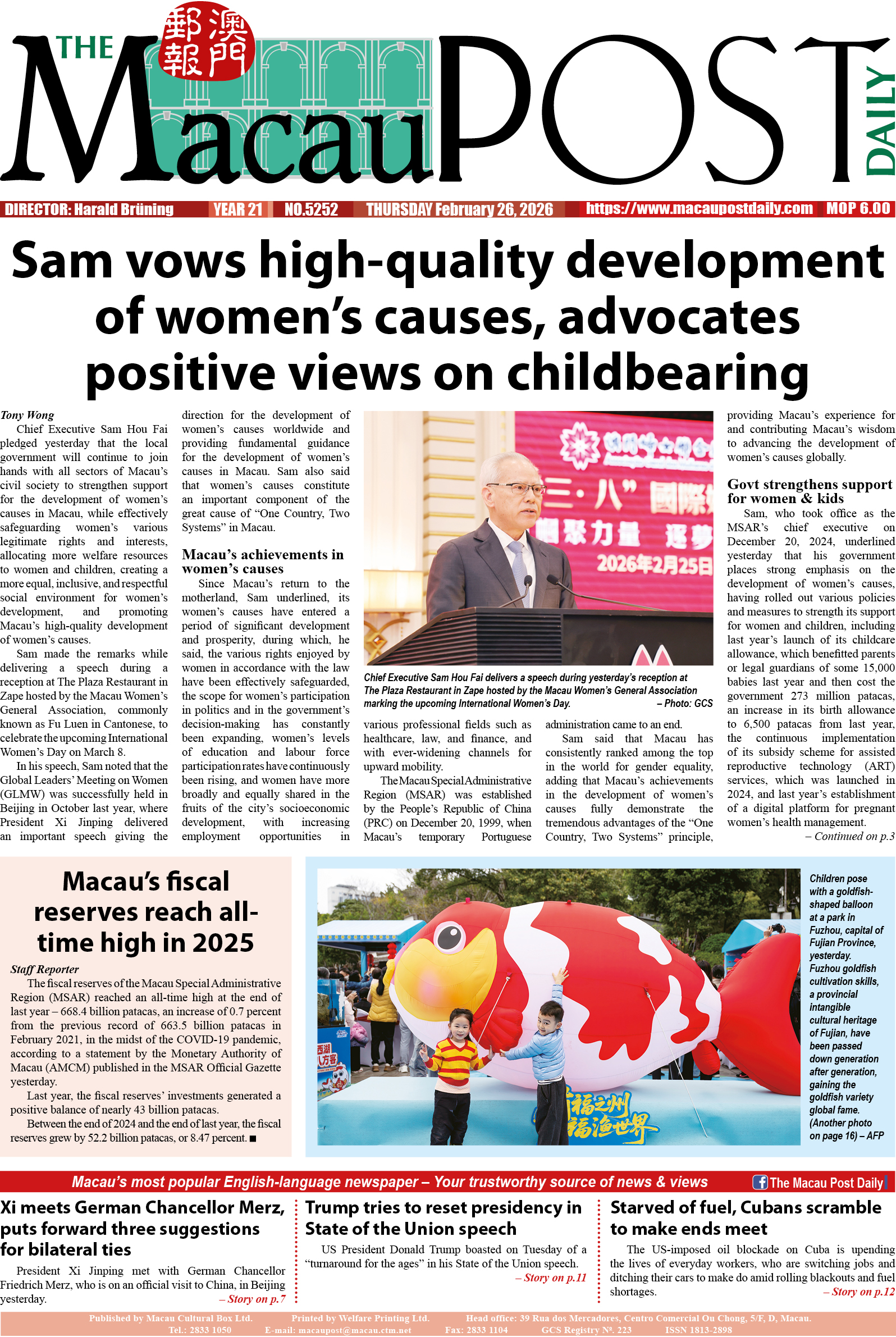Secretary for Economy and Finance Lei Wai Nong announced yesterday an “optimised’ economic support plan offering each permanent and non-permanent resident a 5,000-pataca “startup fund” (i.e. a kind of seed money) and 3,000-pataca immediate discount grant.
Lei also said that for the time being non-resident workers (NRWs) – colloquially known as “blue-card holders” – are not included in the plan for now as “the government is still gathering more opinions about the matter”.
Initially, when announcing the plan last month, the government said it would include NRWs for the first time in one of its economic support schemes.
Lei made the remarks during a press conference about the “optimised” economic support plan at the Economic and Technological Development Bureau (DSEDT) in the city centre.
Last month, the government launched the first outline of its economic support plan in the form of e-vouchers which would have required residents to spend first before receiving the vouchers.
However, civic leaders and citizens found the scheme “too confusing” and “too complicated”. Many also rejected the proposed scheme’s “spend-first” requirement. A few weeks ago, Chief Executive Ho Iat Seng even apologised for the scheme and promised to optimise it.
Two-track system
Lei said that after listening to public opinion, the government drafted a new proposal that is in accordance with the overall principle of “subsidies provided by government, immediate discount upon purchasing products or services, and benefitting all”. He pointed out that the revamped proposal used the electronic consumption smartcard model from last year as a reference. The new scheme has axed the spend-first requirement in favour of a two-track system that offers money and discounts without a spending prerequisite.
Lei explained that after signing up for the new plan via the Macau Monetary Authority (AMCM) website, each resident will receive a 5,000-pataca startup fund either by topping-up last year’s government consumption subsidy smartcard or via one of the eight local digital payment platforms. Lei said on top of that residents will also receive a 3,000-pataca “immediate discount” grant. He underlined that the sign-up period for the new plan is between May and December, while the spending period runs between June and December. He also pointed out that last year’s smartcard can only be topped-up after the balance is cleared to zero. He added that if one decides to receive the money via e-payment platform, one does not need to clear the balance in one’s e-wallet to receive the startup fund.
Economic and Technological Development Bureau (DSEDT) Director Tai Kin Ip said that each resident can use 300 patacas of the startup fund per day, adding that the “immediate discount” would automatically provide 25 percent off a resident’s purchase of eligible goods or services.
Tai’s juice box example
Tai said that, for example, a resident purchases a box of juice that cost four patacas, the immediate discount would be 25 percent off, hence the price to pay for the box of juice would be reduced to three patacas. Tai added that as the three patacas would come out of the startup fund the resident would not have to pay for the box of juice from his or her own pocket. Tai pointed out that after purchasing the box of juice, the resident would have 4,997 patacas remaining in his or her “startup fund” and 2,999 patacas left in the discount grant.
Tai provided another example, saying that if a female resident purchases a baby product costing 400 patacas, with the 25 percent off, which would be 100 patacas, the product would cost the buyer 300 patacas. He added that in this case the female resident would use the maximum amount of the daily limit of her startup fund, which is 300 patacas, to cover the cost of the product, she would not need to pay for it from her own pocket. Tai added that after the purchase, the resident would have 4,700 patacas left of her startup fund and 2,900 patacas left of the discount grant. He stressed that after using up the startup fund, residents could top-up their e-wallets or smartcard to continue using the immediate discount grant.
In other words, if a resident decides to buy items worth 12,000 patacas in one purchase, he or she will receive an immediate discount of 25 percent, which is 3,000 patacas off his or her product. Then the products would cost the buyer 9,000 patacas and after using 300 patacas of the startup fund the customer would need to pay just 8,700 patacas for the products, while no money would be left in the discount grant. However, the startup fund would still contain 4,700 patacas.
Another method of spending the startup fund and the discount grant at its fullest is that a resident purchases 400 patacas worth of items per day, and when the startup fund’s balance reaches 5 patacas, 1,335 patacas of the discount grant would be left. If one tops up the card to 4,005 patacas, one can spend the rest of the discount grant in one go, thereby maximising all benefits of the plan.
Moreover, Tai also said that he acknowledged that residents are worried that the product prices would fluctuate after the launch of the new scheme. Tai promised that the government would work closely with the Consumer Council (CC) to monitor the market prices, adding that residents can file complaints via “Consumidor Online” if they spot an abnormal price increase on a certain product.
During the question-and-answer period, Lei noted that this new proposal’s expected budget is 5.88 billion patacas because according to last year’s record, there were 735,000 residents who signed-up for the smartcard. He said that he hoped that the new scheme would boost Macau’s internal circulation.
Lei also said that parents can sign up for the scheme for their children and if they decide to receive the startup fund through e-payment platforms, their daily limit would be double in the case of one child, from 300 patacas per day to 600 patacas per day. Lei also said that local residents living overseas could collect their startup fund by signing a letter of attorney for their relatives or friends to collect it for them, pointing out that it will be just like last year’s rules with the smartcard.
Tai said he acknowledged that local e-payment platforms have their own forms of discounts or digital wallets, and he stressed that residents can use the government’s startup fund and immediate discount grant alongside shops’ or platforms’ discounts.
When asked whether the startup fund can be used on food delivery platforms, Tai said that the bureau was still negotiating and discussing the possibility of extending the scheme to delivery services. He also said that previously the smartcard could be used on buses so he hoped that the startup fund could also cover public transport. However, he stressed that the startup fund and immediate discount grant cannot be used to purchase items on non-local platforms like Alibaba and Taobao.
Lei said that in the previous plan, which never got off the ground, there was a separate plan for the elderly. However, after listening to public opinion, the government decided to combine the two plans in the new “optimised” plan. He also pointed out that the startup fund and the discount grant cannot be used for certain purposes, such as for casino gambling, or to pay utility, telephone and Macau Cable TV bills, medical bills, as well as for bank, insurance and pawnshop payments, and crossborder or outbound travel fees.
Reporters asked Lei why the new plan does not cover “blue-card holders”, and non-locals studying in Macau’s higher-education institutions, he said that for now residents were “the priority” and the government was still collecting opinions from the public.
Lei emphasised that more details would be revealed at another press conference before the sign-up period in May.
Caritas hopes discount grant to include NRWs
Caritas Macau Secretary General Paul Pun Chi Meng told The Macau Post Daily yesterday he hoped that the government would at least include NRWs in the discount grant as they are “living under the same sky” as Macau residents. Pun also said the government should also “extend a helping hand” to NRWs. He pointed out that the previous plan said it would include NRWs which “got their hopes up”, adding that now that they are not included in the “optimised” plan, they will be disappointed.
Pun said that NRWs may not need to have a discount grant of 3,000 patacas because it would mean that they would need to spend a lot more money to use up the grant, but he hoped that the government could still provide a certain amount to make their daily lives easier.

Secretary for Economy and Finance Lei Wai Nong (right) and Economic and Technological Development Bureau (DSEDT) Director Tai Kin Ip address yesterday’s press conference about the government’s “optimised” economic support plan at the DSEDT headquarters. Photo: GCS

Media workers attend yesterday’s presser about the “optimised” economic support plan at the bureau. Photos: GCS








